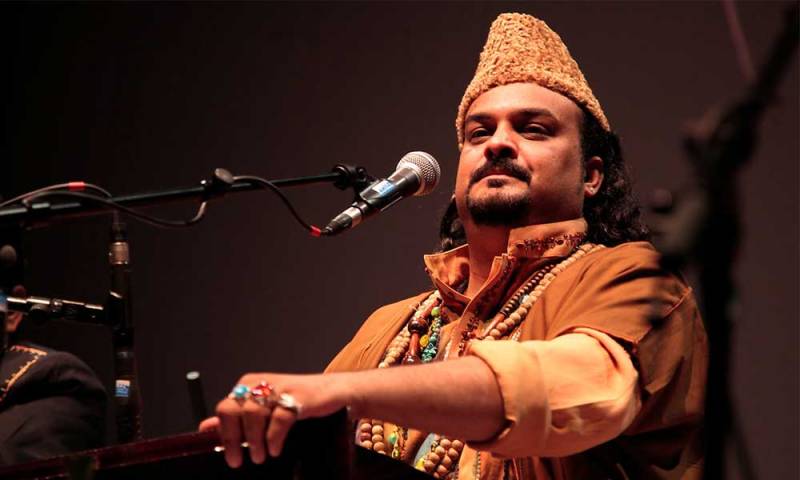June 22, 2016 was yet another sad day in the long string of sad days that Pakistan has been witnessing since in forever, it seems. We lost Ghulam Amjad Sabri to hate.
Ghulam Amjad Sabri was the son of Ghulam Farid Sabri, the carrier of his father’s legacy and the collective legacy of the Sabri Brothers and a legend in his own right in the world of Qawali. His voice was forcibly silenced as bullets rained down on him while he sat in his car. He was 45 years old, a father, a husband, an ambassador of peace, someone who sang praises of the Holy Prophet and the Ahl-e-Bayt and probably believed that his passionate words might bring some sense to this mundane, bloodthirsty society that no longer recognizes love.
Amjad Sabri was a Qawal. A qawal is someone who sings qawalis.
A Qawali is a form of Sufi devotional music popular in South Asia. The central themes of Qawali are love, devotion and longing of man for the Divine. In essence, it is an ode to the greatness of the Holy Prophet of Islam, his blessed family and their disciples. A gift of song, it is part of a musical tradition that can be traced back to more than 700 years.
Amir Khusro Dehlvi who belonged to the Chishti order of Sufis, an Order known for its emphasis on love, tolerance, and openness, was the creator of this unique musical tradition. His vast knowledge of languages and love for poetry enabled him to create this amazing fusion of the Persian, Arabic, Turkish, and Indian musical traditions in the late 13th century in India to create Qawali as we know it today.
It is believed that Amir Khusro’s spiritual mentor, Sultan-ul-Hind Khwaja Nizamuddin Auliya, was a great lover of qawalis. The art progressed and prospered under his patronage. Originally, qawalis were performed mainly at Sufi shrines throughout South Asia but over time, as mainstream media recognized the richness of this tradition, its music and its prose, it became popular among the masses.
We all have grown up listening to the beautiful verses sung by Aziz Mian, NusratFateh, Bahauddin Qutbuddin and the amazing Sabri Bothers.
Amjad Sabri was the son of Ghulam Farid Sabri, the older of the two Sabri Brothers. The Sabri band of qawals was unique as it was them who gave the West its first taste of this particular brand of Islamic music when they performed in New York’s Carnegie Hall in 1975. The brothers Farid and Maqbool were presented with a Pride of Performance, the highest civilian award in Pakistan, by the President of Pakistan in 1978 and 1970 respectively. Although, the two Sabri brothers – Farid and Maqbool – performed together, Maqbool Sabri was left in charge after the death of Farid Sabri in 1994. After Maqbool Sabri passed away in 2011, the tradition was led on by Amjad Sabri.
Bhar Do Jholi Meri Ya Muhammad, Tajdar-e-Haram, Ya Sahib-al-Jamaalwa Ya Syed-al-Bashar used to be a household staples. I remember those times. And in case you didn’t know, the one declaring ‘Allah’ in between the lyrics is Ghulam Farid Sabri. Can't miss that. That chant became his trademark.
It were these voices that made our childhood more soulful and made religion so easy to understand and love. Tolerance and peace was their message. Love was what they talked about. These people were stars; icons of culture and passion that was supposed to be the soul of our society.These voices were free of sect and borders. They belonged to everyone.
Such was the legacy that Amjad Sabri was safeguarding and carrying on for future generations to cherish. But he was brutally silenced. Massacred. Snatched away from us even when we are terribly suffocated for peace and sanity!
In a world where being Muslim is associated with terrorism and evil and that association comes with its own color card – mild, passive, sleeper, radical, liberal, almost, confused, add your own shade to the mix – Amjad Sabri’s voice had the power to tear through the noise and be heard. He was the one upholding the Islamic tradition of inclusivity and ‘live and let live’ with his art. Singing praises of his Prophet and professing his love for his Prophet, he was proving the haters so wrong about the religion he followed.
The way international media (New York Times, CNN, BBC, Al-Jazeera, Washington Post and The Guardian among others) has responded with shock and sorrow over his death is testament to the greatness of his message of love.
On this sad day, in this blessed month of Ramadan, I’m once more grieving for the death of another Muslim. I hope this will not be the end of tolerant voices, courageous voices no matter how small. I hope this will not be the end of the beautiful, the true expression of Islam.
Rest in peace Ghulam Amjad Sabri.






